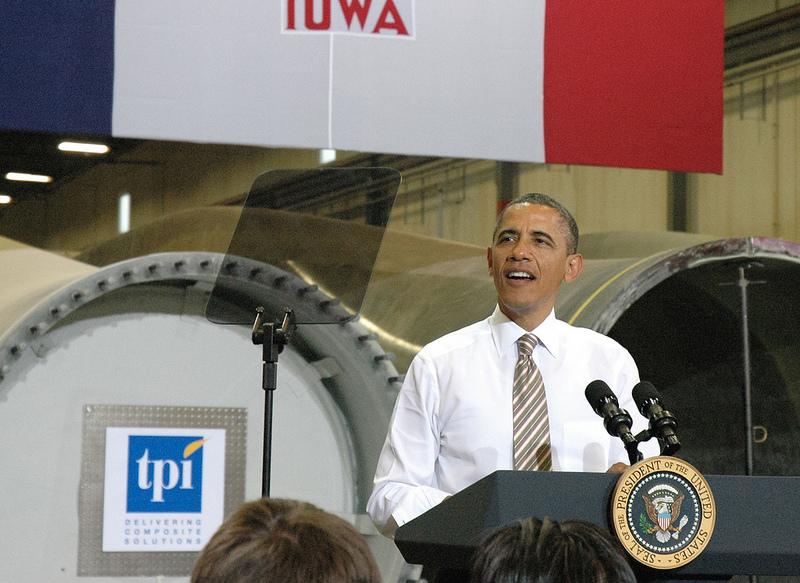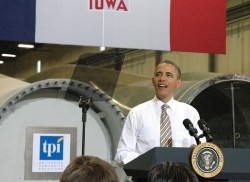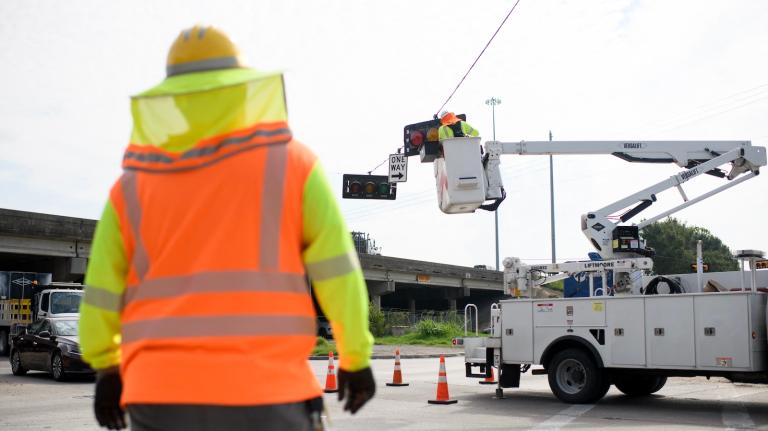A version of this post originally appeared on Climate Progress.
Last month, the White House edited climate change from Obama’s Earth Day 2012 proclamation. That was after the president omitted any discussion of climate change from his State of the Union address.
But then, in a Rolling Stone interview, Obama unexpectedly broke out of his self-imposed silence on climate change, saying he thought climate change would be a campaign issue.
Of course, it would be hard for climate to be a campaign issue if the president doesn’t actually talk about it in public. After all, his challenger Mitt Romney seems unlikely to bring it up, having Etch-a-Sketched his position on that subject many times. And Lord knows that media isn’t itching to talk about climate.
So it was disappointing again once again that on Thursday the president reverted to form in his big speech on energy at TPI Composites, a wind-blade manufacturing plant in Newton, Iowa.
The speech never mentions “climate change” or “global warming” or even “greenhouse gases” or “carbon” or even “pollution”!
It’s a fairly long speech, over half of which is focused on energy, to argue for extending “tax credits that are set to expire at the end of the year for clean-energy companies like TPI.” Those credits are certainly worth fighting for since 37,000 wind jobs are at stake — as is leadership in a global industry that will be one of the largest job creators in the coming decades when the world finally starts taking serious action on climate.
But as Rep. Henry Waxman (D-Calif.), the ranking minority member of the House Energy and Commerce Committee, said last year:
If you are a science denier, there is no reason for government to invest in clean energy.
Now it may be that in the current political climate, no argument would win. But both climate action and federal clean energy investment are classic wedge issues that have broad support with the American public, including independents and moderate Republicans, those not aligned with the Tea Party.
Here are the president’s remarks on energy in Iowa:
The fifth item on my “To-Do” list — I’m calling on Congress to extend tax credits that are set to expire at the end of the year for clean-energy companies like TPI. (Applause.) Let’s not wait. Let’s do it now. (Applause.)
Many of you know the story of what’s happening here better than I do, but I just want to remind you how far we’ve come. Shortly after I took office, I came to Newton — some of you remember — and we unveiled an all-of-the-above energy strategy for America. We said let’s produce more oil and gas, but let’s also produce more biofuels; let’s produce more fuel-efficient cars; let’s produce more solar and wind power and other sources of clean, renewable energy. And I came to Newton because Newton is helping to lead the way when it comes to building wind turbines.
And since then, our dependence on foreign oil has gone down every single year that I’ve been in office — every single year. (Applause.) America is now producing more domestic oil than any time in the last eight years. But we’re also producing more natural gas, and we’re producing more biofuels than any time in our history. And that’s good for the Iowa economy. (Applause.) We’re laying the foundation for some of our nation’s first offshore wind farms. And since I became President, America has nearly doubled the use of renewable energy, like solar power and wind power — we’ve nearly doubled it. (Applause.)
So this country is on the path towards more energy independence. And that’s good for everybody. It’s good for people’s pocketbooks; it’s good for the environment; it’s good for our national security. We don’t want our economy dependent on something that happens on the other side of the world. We don’t want every time there’s a scare about war or some regime change in the Middle East that suddenly everybody here is getting socked and the whole economy is going down.
And the best thing is, in the process, we’re also putting thousands of Americans back to work — because the more we rely on American-made energy, the less oil we buy from other countries, the more jobs we create here at home, the more jobs we create here in Iowa.
So let’s look at the wind industry. It’s so important to Iowa. This industry, thanks in large part to some very important tax credits, has now taken off. The state of Iowa now gets nearly 20 percent of all your electricity from wind — 20 percent. Overall, America now has enough wind capacity to power 10 million homes. So this is an industry on the rise. And as you know, it’s an industry that’s putting people to work. You know this firsthand. There are more wind power jobs in Iowa than any other state. That’s a big deal. (Applause.)
And one of these modern windmills has more than 8,000 different parts — everything from the towers and the blades to the gears, to the electrical switches. And it used to be that almost all these parts were imported. Today, more and more of these parts are being made here in America — right here. (Applause.) We used to have just a few dozen manufacturing facilities attached to the wind industry. Today we have nearly 500 facilities in 43 states employing tens of thousands of American workers — tens of thousands.
So we’re making progress. And you know it better than anybody. I mean, when I was talking to Quinten and Mark and a whole bunch of the other folks who are working here, they reminded me of the experience of working at Maytag and putting your heart and soul into a company and making a great product, and then, suddenly having that company leave, and how hard that was for families and how hard it was for the community. But folks made the transition.
And now, when you look at what’s happening here — 700 to 800 jobs, over $30 million being put back into the community — this gives folks hope. It gives people opportunity. I met some folks who have been in manufacturing for 30 years, but I also met a couple of young folks who were just getting started. And that’s what we’re looking for. Nobody wants a handout. Nobody wants to get something for nothing. But if we’ve got a chance to create energy and create value and put people back to work, why wouldn’t we do that?
So I’m here today because, as much progress as we’ve made, that progress is in jeopardy. If Congress doesn’t act, those tax credits that I mentioned — the ones that helped build up the wind industry, the ones that helped to bring all these jobs to Newton — those tax credits will expire at the end of the year if Congress doesn’t do anything.
If Congress doesn’t act, companies like this one will take a hit. Jobs will be lost. That’s not a guess, that’s a fact. We can’t let that happen. And keep in mind that — and this is something Congress needs to understand — Dave Loebsack understands it, but I want every member of Congress to understand it. These companies that are putting in orders for these amazing blades, they’re making plans now. They’re making decisions now. So if they’re cutting back on their orders, if they’re not confident that the industry is going to be moving at a fast clip and they start reducing orders here, that affects you. You can’t wait for six months. You can’t wait for eight months. You can’t wait for a year to get this done. It’s got to be done now. (Applause.)
So this is a simple thing on Congress’s “To-Do” list — extend these tax credits. Do it now. Every day they don’t act business grows more concerned that they will not be renewed. They’re worried demand for their products is going down, so they start thinking twice about expanding, more cautious about making new investments. They start looking overseas. I was talking to your CEO. We got an opportunity to branch out, but we want to branch out by making the stuff here and then sending it there. We don’t want to branch out by sending the jobs and the investments over there, and then shipping it back to America. That doesn’t make sense. (Applause.) One company that had plans to invest $100 million to build a wind manufacturing plant in Arkansas — and create hundreds of jobs — put those plans on hold.
And by the way, this should not be a partisan issue. There are several Republican governors — including the governor of this state — who are calling on Congress to act. There are members of Congress in both chambers and on both sides of the aisle — including your two senators — who support these tax credits. And that doesn’t happen much in Washington where Democrats and Republicans say they agree on something. So if you agree, why haven’t we gotten it done yet?
This is not just an issue, by the way, for the wind industry. Some of America’s most prominent companies — from Starbucks to Campbell’s Soup — they’re calling on Congress to act because they use renewable energy.
Well, actually many of those companies are calling on Congress to act because they are concerned about global warming, for which renewable energy is a core solution — see “Starbucks: Global Warming Is Hurting Coffee.”
How lame is it that a high-end coffeehouse chain is more comfortable talking about the gravest threat to the nation’s health and well-being than the president of the United States?





